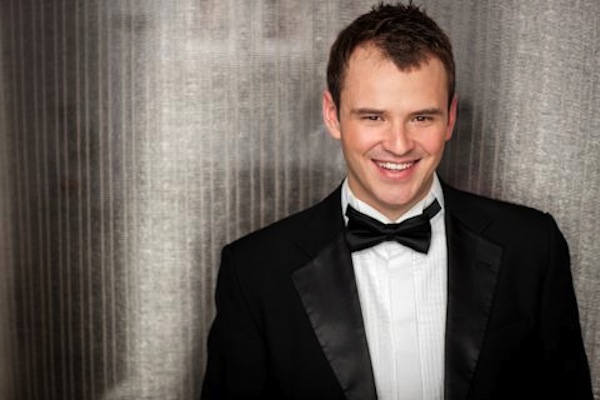
Alexey Lavrov, A good omen
By Sebastian Spreng, Visual Artist and Classical Music Writer
Discovering talent has become a sort of mainstream international sport, including classic audiences pursuing the thrill of being the first to spot a future star. You need to have a good nose for this, and also the good fortune to be in the right place at the right time. There’s nothing like witnessing an event that with time and luck could turn not just memorable but – why not?- legendary.
The feeling that this was such an event likely struck most members of the small audience that attended young baritone Alexey Lavrov’s first American recital. It happened last week at the University of Miami’s Gusman Concert Hall, at the last concert of the Miami Friends of Chamber Music season. Every year, talented pianist Ken Noda introduces a promising newcomer at the series’ sole annual voice recital. Given his track record, there should be at least two of these every year.
Armed with determination befitting his age (26) and backed up by the five years he spent perfecting his craft in Moscow and St. Petersburg, Lavrov landed in New York barely a year ago with his wife, the elegant pianist Ekaterina Deleu. Born in the Russian Republic of Komi, not far from the Arctic Circle, Lavrov, who has participated in international competitions, winning the Hariclea Darclée and Elena Obraztsova Competition, showed why he was literally embraced by the prestigious Lindenmann program for young artists of the Metropolitan Opera, where he made his debut just weeks ago playing a minor part in Don Carlo.
Lavrov surprised the audience with a generous and eclectic program, meant to test its reaction and prove his skills. Singing in Italian, German, French and Russian, he showed off a lyrical baritone with astonishing volume that he softens with almost no effort, a lack of affectation that he should preserve at all costs, the poise of an actor in the making and the ability to turn each song into a short story, told with winning passion, nobility and sincerity.
His voice, boasting the typical brilliance and frank delivery of the Slavic voices, proved delightful in the songs of Rimsky-Korsakov, Rachmaninoff and Tchaikovsky, a high point of the concert, surpassed only by the arias from Iolanta and Eugene Onegin, in which the baritone has a role that fits him perfectly.
Lavrov was convincing not only in his native tongue, but also when singing O Carlo, ascolta from Verdi’s Don Carlo, the serenade and Metà di voi qua vadano from Don Giovanni, and Brahms and Schumann lieder, in which he displayed an affinity for German music not always present in Russian singers. His portrayal of Malatesta (Don Pasquale) and Silvio (I Pagliacci) showcased respectively his comic timing and a dash of verismo fervor, while his rendition of Ravel’s Don Quichotte à Dulcinée compared in charm to his delivery of the program’s next-to-last selection, the famous Parlami d’amore that Cesare Andrea Bixio composed for Vittorio de Sica in the 1932 film Gli uomini, che mascalzoni. Displaying similar spontaneity, he finished the evening with a moving version of Georgy Sviridov’s Oh my homeland, oh happy and eternal hour, accompanied by his wife, who throughout the concert took turns at the piano with Noda.
More than two decades ago, a young Siberian named Hvorostovsky made his debut in these shores. Perhaps Miami again has witnessed the birth of another star from a far corner of the world. May the promise and the premonition come true. Lavrov has the talent to make it happen. Alexey Lavrov
Recent Content
-
Artsarticle ·
-
Artsarticle ·
-
Artsarticle ·
